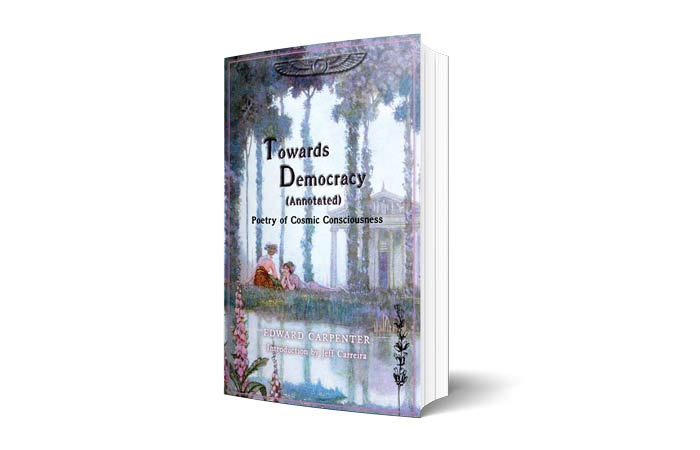
The following introduction by Jeff Carreira is published in the recently released edition of Towards Democracy by Edward Carpenter, published by Emergence Education.
~
You have in your hand a spiritual gem, an extended cry of love, joy and freedom shouted from an open heart and mind. There are times when a writer of talent and grace produces a piece of writing directly from the experience of revelation. Towards Democracy is such a piece. Its words carry the ring of Truth and transmit the vital energy of awakening. This is a book that can be read slowly, savoring the taste of a page or two at a time. It is also a book that can be read in the full absorption of a single long sitting. It is a book to be read once and then again, and again and again.
Speaking with the voice of revelation Carpenter claims to be dreaming the dream of the soul's slow disentanglement. He has seen and celebrates the perfection that lies beyond our misunderstanding of things. He knows that all is equally beautiful, the highest most lofty aspects of life as well as the lowest and most depraved, all are equally beautiful in the eyes of divinity. This is not naïve optimism, but rather an expression of the unity of nondual oneness.
You might imagine that an individual who would paint such a bright picture of reality and the human condition, must not have suffered in life, or was practicing some form of spiritual by-passing and avoiding the obvious darker aspects around him. Nothing could be further from the truth. The author of this remarkable text is Edward Carpenter, an equally remarkable man. He was born in England in 1844 and lived as an openly gay man at a time when that lifestyle was punishable by imprisonment. He was also an early and outspoken advocate of gay rights, prison reform, social justice, environmentalism, economic equity, women's rights, animal rights, vegetarianism and optimal, or what he called radiant health. He was a passionate social reformer working to achieve possibilities that we are still struggling to realize today.
As a poet, the spiritual giant Sri Aurobindo would count him among a new breed and claimed that Carpenter was able to arrive at the free and harmonious accession of human intelligence to profound, large and powerful truths of the spirit. The great Indian sage went on to call Carpenter a prophet of democracy and of the Self, like Whitman, but of a higher, more spiritual truth of the Self. (Aurobindo, The Future of Poetry)
The title of this book of poetry might give you the wrong impression. Democracy is a central theme of the poems, but not in a political sense as much as in the spiritual sense of universal equity. Carpenter sees every aspect of existence as part of the gradual awakening of spirit. If one has the eyes to see, one will see the emergence of the soul in every creature, landscape, and occurrence on Earth. There is only one thing happening here. Divinity is awakening, showing herself repeatedly. Carpenter writes as her surrogate, expressing her view and her opinions. Behold a Mystery! The poem commands, as it asks a poignant question, are you sure you know me when you look upon me?
In 1868 or 69 at the age of twenty-five Carpenter read poetry by Walt Whitman and later Whitman’s book of prose called Democratic Vistas. Reading Whitman’s work left Carpenter with the seed of a new conception of life; an inner revolution had begun in his heart. This revelation was followed by years of struggle that were characterized by deep exhaustion and a growing sense of alienation from life, until finally in 1877 he made the long trip from his home in England to America to visit the great poet who had inspired him so deeply.
In Whitman, Carpenter found an individual who measured up to the greatness of his poetry. He saw in the older man’s eyes a depth of wisdom, softness and peace that inspired awe. He also saw a robust and inspiring embrace of vitality and hearty living. Carpenter began writing scattered pieces of verse, but the effort never congealed into anything finished, until in 1881 a copy of the Hindu scriptures of the Bhagavad Gita found its way into his hands.
In that sacred writing Carpenter found himself in touch with a mood of exaltation and inspiration – a kind of super-consciousness. The mood that came over him harmonized all his previous thoughts and feelings and illuminated their deeper meaning. In this profound awakening Towards Democracy was born. When he started writing his own book of poetry, the one you are now holding in your hands, he found that it appeared to be there waiting for him. He never hesitated in writing and found that older writings seamlessly merged with the new poetry that was coming through him. It was as if he had been receiving pieces of the finished poem for years, but only now was it time for its completion. He felt a sense of inevitableness as he was carried along in his writing. It was as if he was giving birth to the poems rather than creating them. Much later, Carpenter would claim that Towards Democracy had been written from a different level of consciousness than any of his other many books and was the center from which the others all radiated.
When you read the book of poems that follows, you will be reading a direct transmission of Carpenter's awakening to cosmic consciousness. The voice of the poem is the voice of the nondual oneness that exists emergent in all things. You will travel across the world seeing her face as it shines forth through nature and beauty, but also as she reveals herself in deformity and treachery. This absolute equality of being, the ultimate democracy, is the inspiration behind not only these poems, but also all of Carpenter’s lifelong work as a social activist. Having seen that all is One, he could do nothing less than struggle to see that underlying unity revealed in all things by everyone.
The voice of Oneness in these poems warns against the many ways that we hide from the truth of who we are. The pursuit of material wealth, in and of itself no less beautiful than anything else, cannot ultimately bring us to the true fulfillment of wholeness. We cannot find our true Self if we separate from others and see them as less than ourselves. We must eliminate the distance that separates us from one another and from the natural world that is our home. We are called to embrace all species as equally significant and honor the sanctity of all of life. But this is a nondual truth, and so it is not about a possibility that exists somewhere other than here and now. In the end Carpenter claims only to be holding a mirror up so that we might gaze upon the face of divinity.
I heard a voice say: What is Freedom?… and I heard another voice say: I AM.
Towards Democracy is a clear and undiluted expression of Carpenter’s awakening, but his journey did not end with its publication. A decade after this little book was published, he was invited to visit Ceylon by the same friend who had originally given him a copy of the Bhagavad Gita. For six weeks in Ceylon (present day Sri Lanka) Carpenter met daily with a Hindu swami learning the intricacies of the esoteric teachings and practices of the East. It was here that the cycle of understanding that had begun with Whitman’s poetry over two decades earlier, would be complete. He now finally understood what it was that had first entered his soul through the poems in Leaves of Grass and had ultimately given birth to his own Towards Democracy.
After returning from the East he would publish a book in which he would name this revelation cosmic consciousness. He was the first to use the term and it would soon be brought into public prominence by his friend Richard Maurice Bucke who credits Carpenter with introducing him to the phrase. Carpenter and his conception of cosmic consciousness would go on to inspire many of his contemporaries and future generations of spiritually inspired individuals. The ideas he first expressed in Towards Democracy would find their way into Bucke’s popular book, and then into the writings of the American philosopher William James and the Russian mystic P. D. Ouspensky, and, as I have already mentioned, garnered high praise from Sri Aurobindo. Carpenter was also in correspondence with numerous prominent figures of his time including both the theosophist Annie Besant and Mahatma Gandhi. There is almost no part of the alternative spirituality that emerged after Carpenter that was not in some way either directly or distantly touched by his awakened expression of truth.
It is an honor to be able to offer you this beautifully produced book of awakened poetry.
Bibliography
- Bucke, Richard Maurice, Cosmic Consciousness Annotated. Emergence Education, 2021.
- Carpenter, Edward, My Days and Dreams, Being Autobiographical Notes. Sagwan Press, 2015.
- James, William, The Varieties of Religious Experience, a Study in Human Nature. Penguin Classics, 1982
- Ouspensky, P. D., Tertium Organum, The Fourth Dimension as the Esoteric Nature of Reality. Forgotten Books, 2008
- Sri Aurobindo. The Future Poetry. Franklin Classics, 2018.


